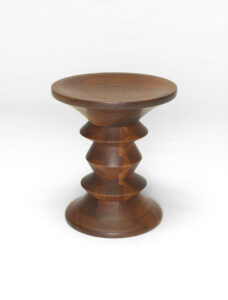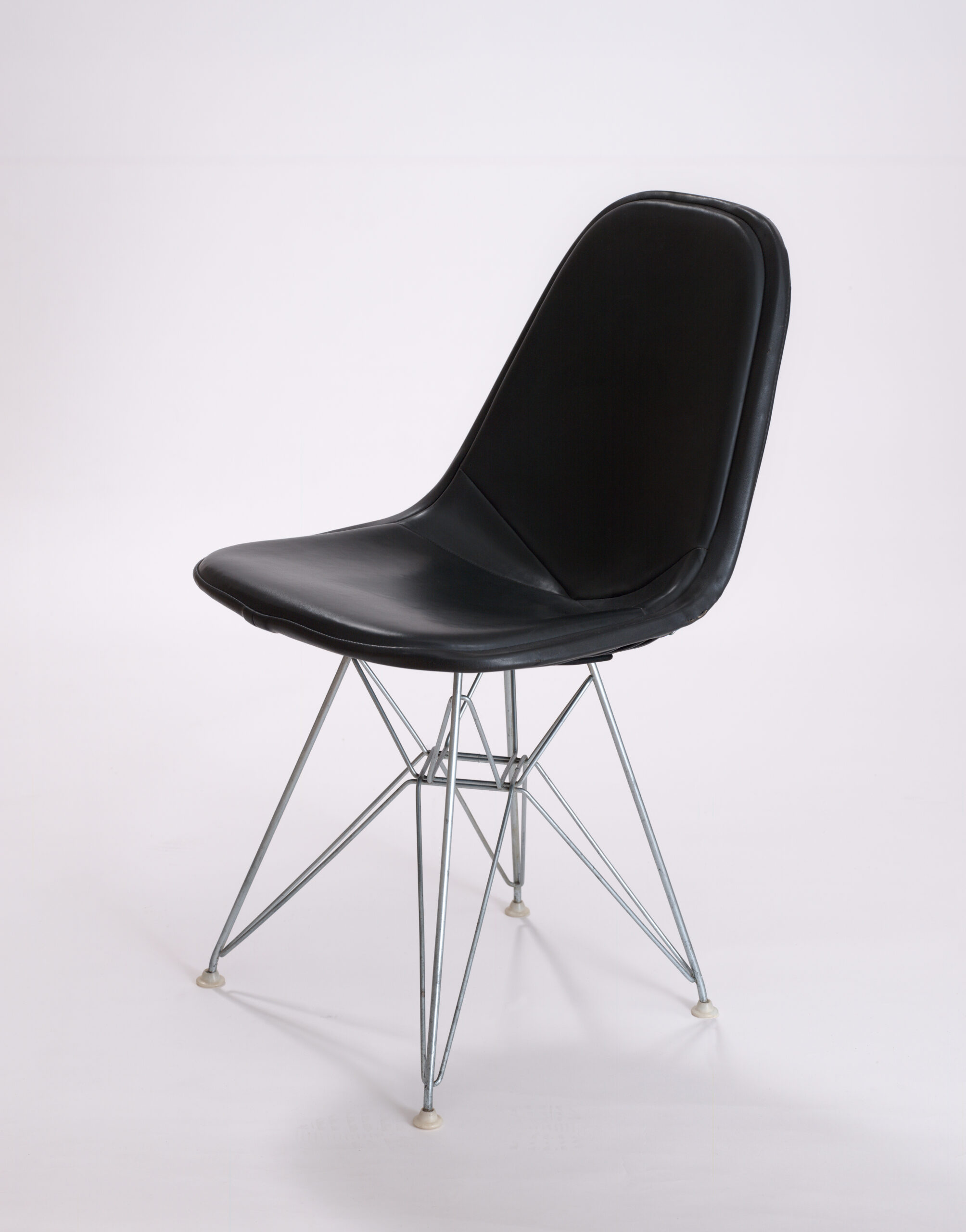Charles and Ray Eames
Charles Ormond Eames and Ray Bernice Alexandra Kaiser met at the Cranbrook Academy of Art in Michigan, where they both studied design and architecture in the late 1930s. They eventually married and developed a joint career based on a commitment to devising "elegant solutions" to design problems.
Ray, a former painter, had assisted Charles and Eero Saarinen with a series of molded plywood chairs and tables — an experience that benefited the couple when they moved to Los Angeles in 1941. There they perfected their process of woodworking and made splints, litters, and aircraft parts for the armed forces during World War II.
In 1946 the Museum of Modern Art, New York, showcased Charles and Ray Eames's new furniture technology. This exhibition secured them a contract with the Herman Miller company in Michigan and initiated a 30-year relationship that produced many of the enduring furniture designs of the twentieth century.
In the late 1940s, the Eameses designed a house for the Case Study House Program sponsored by Arts and Architecture magazine. From the 1950s onward, they expanded their design and architectural practice to include the production of films and exhibitions — including Toccatta for Toy Trains (1957) and Mathematica(1961) — that used a variety of media to engage the imagination of the public.
In 1989, SFMOMA acquired the entire contents of the Eames Office conference room, which design visionaries Charles and Ray Eames had occupied for over 40 years. Using historic photographs as a guide, SFMOMA re-assembled the conference room as it was arranged during the time of its use, and presented it as part of the 2018 exhibition Designed in California.Close study of the conference room’s artifacts and audiovisual technology was supported in part by SFMOMA’s Artist Initiative, which is generously funded by a grant from the Andrew W. Mellon Foundation.
Works in the Collection
-
 Charles Eames, Ray Eames, Herman Miller Inc.DCM (Dining chair metal)
Charles Eames, Ray Eames, Herman Miller Inc.DCM (Dining chair metal) -
 Charles Eames, Ray Eames, Herman Miller Inc.Walnut stool B
Charles Eames, Ray Eames, Herman Miller Inc.Walnut stool B -
Charles Eames, Ray EamesLCM
-
 Charles Eames, Ray EamesLa Fonda chair
Charles Eames, Ray EamesLa Fonda chair -
 Charles Eames, Ray Eames, Herman Miller Inc.LCW (Lounge chair wood)
Charles Eames, Ray Eames, Herman Miller Inc.LCW (Lounge chair wood) -
 Charles Eames, Ray Eames, Herman Miller Inc.Walnut stool C
Charles Eames, Ray Eames, Herman Miller Inc.Walnut stool C -
 Charles Eames, Ray Eames, Herman Miller Inc.Walnut stool A
Charles Eames, Ray Eames, Herman Miller Inc.Walnut stool A -
 Charles Eames, Ray EamesLa Fonda Table prototype
Charles Eames, Ray EamesLa Fonda Table prototype -
 Charles Eames, Ray Eames, Evans Products Company, Molded Plywood DivisionFSW (Folding Screen Wood)
Charles Eames, Ray Eames, Evans Products Company, Molded Plywood DivisionFSW (Folding Screen Wood) -
 Charles Eames, Ray EamesLa Fonda chair
Charles Eames, Ray EamesLa Fonda chair -
 Charles Eames, Ray EamesLa Fonda chair
Charles Eames, Ray EamesLa Fonda chair -
 Charles Eames, Ray Eames, Evans Products Company, Molded Plywood DivisionLeg Splint, Wrapped
Charles Eames, Ray Eames, Evans Products Company, Molded Plywood DivisionLeg Splint, Wrapped -
 Charles Eames, Ray EamesLCW (Lounge chair wood)
Charles Eames, Ray EamesLCW (Lounge chair wood) -
Charles Eames, Ray Eames, Herman Miller Inc.DCM (Dining chair metal)
-
 Charles Eames, Ray Eames, Banner Metals, Herman Miller Inc.Wire chair (DKR1)
Charles Eames, Ray Eames, Banner Metals, Herman Miller Inc.Wire chair (DKR1) -
 Charles Eames, Ray Eames, Herman Miller Inc.Soft Pad Sofa
Charles Eames, Ray Eames, Herman Miller Inc.Soft Pad Sofa -
Charles Eames, Ray EamesEames Storage Unit
-
 Charles Eames, Ray Eames, Evans Products Company, Molded Plywood DivisionLeg Splint
Charles Eames, Ray Eames, Evans Products Company, Molded Plywood DivisionLeg Splint -
 Charles Eames, Ray EamesDAT (Desk Armshell Tilt)
Charles Eames, Ray EamesDAT (Desk Armshell Tilt)
Please note that artwork locations are subject to change, and not all works are on view at all times.
Only a portion of SFMOMA's collection is currently online, and the information presented here is subject to revision. Please contact us at collections@sfmoma.org to verify collection holdings and artwork information. If you are interested in receiving a high resolution image of an artwork for educational, scholarly, or publication purposes, please contact us at copyright@sfmoma.org.
This resource is for educational use and its contents may not be reproduced without permission. Please review our Terms of Use for more information.